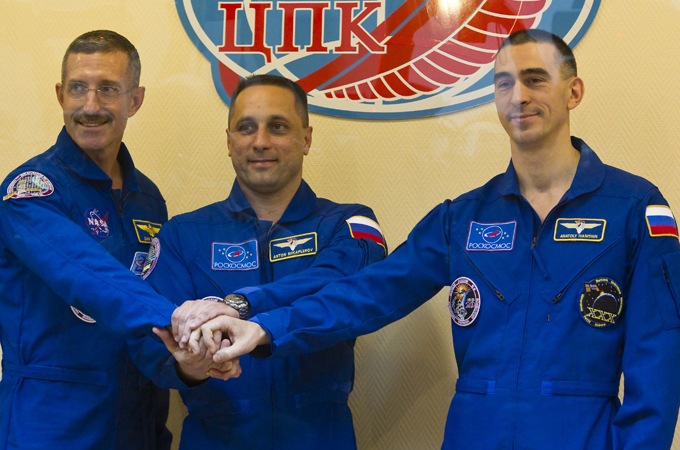Russian rocket lifts off for space station
Russian-US crew heads for International Space Station after first manned launch since retirement of NASA space shuttle.

 |
| The International Space Station (ISS) crew of a US astronaut (L) and two Russian cosmonauts [Reuters] |
Two Russian cosmonauts and a US astronaut are heading for the International Space Station (ISS) after blasting off aboard a Russian rocket from Baikonur cosmodrome in Kazakhstan.
Monday’s lift-off went smoothly, providing a boost for Russia whose space programme has been hit by the loss of half a dozen satellites over the last year due to faulty launches.
“Everything is normal and we are feeling fine,” the crew reported back to mission control over the radio. Mission control reported that the Soyuz TMA-22 capsule had successfully gone into earth orbit.
The morning launch of the Soyuz-FG rocket lit up the grey skies over Baikonur, which was covered in an early fall of snow.
Russians Anton Shkaplerov and Anatoly Ivanishin and American Dan Burbank are due to dock with the ISS on Wednesday morning, joining three crew already on board.
The lift-off from Baikonur was the first manned launch since the retirement of the US space shuttle made Russia the sole nation capable of taking crew to the ISS.
It is also the first manned launch after an unmanned Progress supply vessel bound for the ISS crashed into Siberia shortly after take-off from Baikonur in August, in Russia’s worst space mishap in years.
Russia suspended manned rocket launches for three months as a consequence of that accident.
Russian scientists are also bracing for the likely loss of the Phobos-Grunt probe for Mars which was launched on November 9 but has failed to head out of Earth orbit on its course to the red planet.
The last manned launch from Baikonur was in June, and the problems have been a major disappointment for Russia in the year marking half a century since Yuri Gagarin made man’s first voyage into space from the same historic cosmodrome.
Besides the Progress and possibly Phobos-Grunt, Russia has lost three navigation satellites, an advanced military satellite and a telecommunications satellite due to faulty launches in the past 12 months.
“We have no ‘dark’ thoughts,” Shkaplerov said ahead of the launch. “We have confidence in our technology,” he said, quoted by the Interfax news agency.